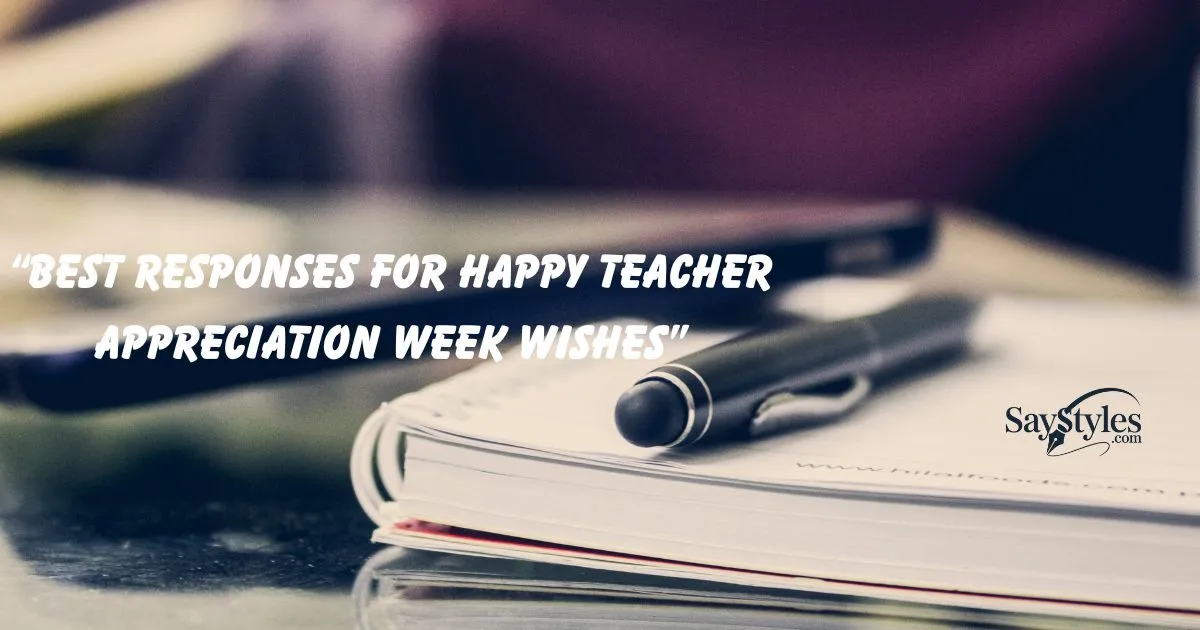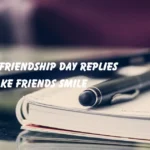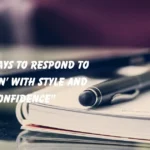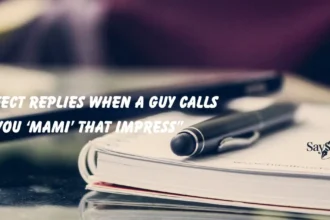“Heartfelt responses for Happy Teacher Appreciation Week remind us that gratitude has power.”
As I sit to write, I can’t help but think about the teachers who shaped my life. Their lessons went beyond books they taught patience, kindness, and courage. Saying thank you feels small compared to what they give every day, but the right words can truly warm a teacher’s heart.
I want this piece to feel real, not formal. Just like when we talk to a teacher face-to-face, our words should carry honesty and respect. Teacher Appreciation Week is more than a date it’s a chance to pause and let them know how much they matter.
In this article, you’ll find heartfelt responses, creative thank-you ideas, and simple ways to make your teachers smile. When you’re a student, parent, or friend, these words will help you show gratitude in the best way possible.
1. “Thank you so much! Your kind words truly brighten my day.”
Story: Mrs. Allen received a sweet handwritten note from her student, and she replied with this line to show how much the message touched her heart.
When to Use: Use this when a student or parent shares heartfelt words of appreciation.
When Not to Use: Avoid it in staff meetings or professional reports where formal tone is required.
Example:
Student: “Happy Teacher Appreciation Week! You mean so much to us.”
Teacher: “Thank you so much! Your kind words truly brighten my day.”
How to Respond 🗣️ Add, “You make teaching worthwhile,” or “Your support means everything.”
2. “I feel blessed to have students like you who make teaching meaningful.”
Story: Mr. Khan responded with this line after one of his students thanked him for being patient and kind during tough lessons.
When to Use: Perfect when you want to show gratitude for supportive and motivated students.
When Not to Use: Not ideal in casual exchanges where a quick thank-you is enough.
Example:
Student: “Thank you for always helping me understand math!”
Teacher: “I feel blessed to have students like you who make teaching meaningful.”
How to Respond 🗣️ You can follow up with “It’s students like you that inspire me daily.”
3. “Your appreciation means the world—grateful for your thoughtfulness.”
Story: Ms. Rivera received a surprise card during Teacher Appreciation Week and used this reply to express how valued she felt.
When to Use: Use it when someone goes out of their way to appreciate your effort.
When Not to Use: Don’t use it for quick text replies where short words work better.
Example:
Parent: “We appreciate everything you do for our children.”
Teacher: “Your appreciation means the world—grateful for your thoughtfulness.”
How to Respond 🗣️ Try saying, “It motivates me to keep giving my best.”
4. “Thank you for making Teacher Appreciation Week so special for me.”
Story: Mrs. Patel’s students decorated the classroom and gave her a card, and she replied with this heartfelt line.
When to Use: Best when students or parents plan something meaningful during the week.
When Not to Use: Not suitable for casual one-on-one thank-you notes.
Example:
Class: “Happy Teacher Appreciation Week, Miss!”
Teacher: “Thank you for making Teacher Appreciation Week so special for me.”
How to Respond 🗣️ Add, “You made my week unforgettable.”
5. “I’m honored to be part of your learning journey—thank you!”
Story: Mr. Brown replied with this line when his student shared how much they had learned from him over the year.
When to Use: Great when a student recognizes your role in their progress.
When Not to Use: Avoid in short, casual thank-you exchanges.
Example:
Student: “You’ve taught me so much this year, thank you!”
Teacher: “I’m honored to be part of your learning journey—thank you!”
How to Respond 🗣️ Say, “Your growth is the best gift for me.”
6. “Your message reminds me why I chose to be a teacher.”
Story: Ms. Lopez received a thoughtful note from a student, and it brought her back to the passion she had when starting her teaching career.
When to Use: Use it when a message touches your heart and reminds you of your purpose.
When Not to Use: Avoid short conversations where a brief thank-you works better.
Example:
Student: “You’ve changed the way I see learning.”
Teacher: “Your message reminds me why I chose to be a teacher.”
How to Respond 🗣️ Follow with, “You inspire me to keep teaching with love.”
7. “Thanks a lot! Seeing my students grow is the greatest reward.”
Story: Mr. Shah replied to a class message where students wrote about how much they had improved because of him.
When to Use: Perfect when students thank you for your teaching efforts.
When Not to Use: Don’t use it for casual greetings.
Example:
Student: “Thank you for helping me improve in science.”
Teacher: “Thanks a lot! Seeing my students grow is the greatest reward.”
How to Respond 🗣️ Add, “Your success is what makes me happiest.”
8. “Your words of kindness make all the hard work worth it.”
Story: Mrs. Taylor felt emotional when her class shared a video montage of their appreciation.
When to Use: Best for heartfelt, emotional thank-you messages.
When Not to Use: Not ideal for short or funny exchanges.
Example:
Class: “We appreciate everything you do for us.”
Teacher: “Your words of kindness make all the hard work worth it.”
How to Respond 🗣️ Say, “This means more than you’ll ever know.”
See also: Best Happy Friendship Day Replies to Make Friends Smile
9. “Thank you for recognizing my efforts—it means everything.”
Story: Mr. Ahmed said this after a student’s parent expressed gratitude for his dedication.
When to Use: Great when someone appreciates your effort beyond academics.
When Not to Use: Avoid it in short replies where a simple thank-you works.
Example:
Parent: “You’ve gone above and beyond for our kids.”
Teacher: “Thank you for recognizing my efforts—it means everything.”
How to Respond 🗣️ Add, “Your words motivate me to do more.”
10. “I appreciate your thoughtful message, it truly touched my heart.”

Story: Ms. Green smiled warmly when she received a heartfelt card during Teacher Appreciation Week.
When to Use: Perfect for personal notes or touching words.
When Not to Use: Not for quick social media replies.
Example:
Student: “You’re the best teacher I could ask for.”
Teacher: “I appreciate your thoughtful message, it truly touched my heart.”
How to Respond 🗣️ Follow with, “I’ll always treasure this moment.”
11. “Thank you! Teaching you has been one of my greatest joys.”
Story: Mr. Evans wrote this after a student shared how much they enjoyed being in his class.
When to Use: Great when you want to highlight joy in teaching.
When Not to Use: Not suitable for formal recognition events.
Example:
Student: “You made learning so much fun.”
Teacher: “Thank you! Teaching you has been one of my greatest joys.”
How to Respond 🗣️ Say, “Students like you make teaching a blessing.”
12. “Your appreciation encourages me to keep giving my best.”
Story: Ms. Johnson replied this after her students gifted her flowers and a thank-you card.
When to Use: When a gesture of appreciation motivates you further.
When Not to Use: Avoid it if you’re keeping the exchange very casual.
Example:
Student: “We’re thankful for you, Miss!”
Teacher: “Your appreciation encourages me to keep giving my best.”
How to Respond 🗣️ Add, “I’ll always do my best for you.”
13. “Grateful for your warm wishes this Teacher Appreciation Week.”
Story: Mr. Wilson sent this after receiving dozens of text messages from his class.
When to Use: Best for multiple students who wish you together.
When Not to Use: Skip it for one-on-one personal thank-yous.
Example:
Class: “Happy Teacher Appreciation Week!”
Teacher: “Grateful for your warm wishes this Teacher Appreciation Week.”
How to Respond 🗣️ Try, “You made my week brighter.”
14. “Thank you for reminding me of the impact teachers can have.”
Story: Mrs. Kumar felt moved after a student wrote about how she inspired them to pursue education.
When to Use: Perfect when a student shares a life-changing impact.
When Not to Use: Not for lighthearted banter.
Example:
Student: “You’ve changed my view of learning forever.”
Teacher: “Thank you for reminding me of the impact teachers can have.”
How to Respond 🗣️ Say, “Your success is my greatest achievement.”
15. “Your message made my day brighter—thank you kindly!”
Story: Mr. Parker replied to a cheerful note left on his desk.
When to Use: Use when a message lifts your mood instantly.
When Not to Use: Avoid it if you need a formal tone.
Example:
Student: “We appreciate you so much, sir.”
Teacher: “Your message made my day brighter—thank you kindly!”
How to Respond 🗣️ Add, “You always know how to make me smile.”
16. “I feel lucky to have students who value my work.”
Story: Ms. White wrote this after her students decorated her classroom with appreciation posters.
When to Use: Perfect when students show collective gratitude.
When Not to Use: Not needed for simple one-liners.
Example:
Class: “We love you, Miss White!”
Teacher: “I feel lucky to have students who value my work.”
How to Respond 🗣️ Add, “You give me purpose as a teacher.”
17. “Thank you for making me feel so appreciated and valued.”
Story: Mr. Lee said this after parents organized a Teacher Appreciation breakfast.
When to Use: Best when others put effort into celebrating you.
When Not to Use: Not for casual, lighthearted messages.
Example:
Parent: “We appreciate your dedication.”
Teacher: “Thank you for making me feel so appreciated and valued.”
How to Respond 🗣️ Say, “This means more than words can say.”
18. “Your thoughtful words inspire me to continue teaching with passion.”
Story: Ms. Martinez felt encouraged when her student praised her love for teaching.
When to Use: When you want to show appreciation for motivating words.
When Not to Use: Skip in short thank-you replies.
Example:
Student: “You make learning exciting!”
Teacher: “Your thoughtful words inspire me to continue teaching with passion.”
How to Respond 🗣️ Add, “I’ll keep giving you my best.”
See also: “Smart and Funny Responses to ‘Why Are You Crying?’ That Work”
19. “Thanks so much—your recognition means more than you know.”
Story: Mr. Carter shared this reply after receiving a public thank-you from the school principal.
When to Use: Great for formal or public appreciation moments.
When Not to Use: Too serious for casual greetings.
Example:
Principal: “We honor your dedication to teaching.”
Teacher: “Thanks so much—your recognition means more than you know.”
How to Respond 🗣️ Follow with, “I’m grateful for this support.”
20. “I truly appreciate your kindness during Teacher Appreciation Week.”
Story: Mrs. Khan sent this after students handed her flowers during morning assembly.
When to Use: Best when students do something thoughtful as a group.
When Not to Use: Avoid short social media replies.
Example:
Students: “We appreciate you, Miss!”
Teacher: “I truly appreciate your kindness during Teacher Appreciation Week.”
How to Respond 🗣️ Say, “You made this week unforgettable.”
21. “Your appreciation motivates me to work even harder.”
Story: Mr. Brown said this after his class gave him a handmade scrapbook full of thank-you notes.
When to Use: When you want to show that their gratitude pushes you forward.
When Not to Use: Avoid for simple thanks where no deeper emotion is needed.
Example:
Student: “You inspire us every day!”
Teacher: “Your appreciation motivates me to work even harder.”
How to Respond 🗣️ Add, “I’ll always give my best for you.”
22. “I’m so thankful for your thoughtful message.”
Story: Ms. Rivera replied to a kind email from a parent highlighting her positive influence on their child.
When to Use: Best when responding to a sincere, personal message.
When Not to Use: Too formal for short, casual chats.
Example:
Parent: “You’ve changed the way my child enjoys school.”
Teacher: “I’m so thankful for your thoughtful message.”
How to Respond 🗣️ Say, “Your support means a lot to me.”
23. “Your words mean the world to me—thank you for your kindness.”
Story: Mrs. James felt emotional when her students sang a thank-you song in class.
When to Use: When gratitude touches you deeply.
When Not to Use: Not suitable for playful or light replies.
Example:
Class: “We appreciate you, Miss!”
Teacher: “Your words mean the world to me—thank you for your kindness.”
How to Respond 🗣️ Add, “This will stay with me forever.”
24. “Thanks a ton—your support makes teaching even more rewarding.”
Story: Mr. Patel said this after a fellow teacher praised his hard work during the week.
When to Use: Great for acknowledging encouragement from peers.
When Not to Use: Avoid student-to-teacher one-liners.
Example:
Colleague: “You’re doing an amazing job with your class.”
Teacher: “Thanks a ton—your support makes teaching even more rewarding.”
How to Respond 🗣️ Add, “I really value your encouragement.”
25. “I appreciate you taking the time to make me feel valued.”
Story: Ms. Moore said this when her class decorated her desk with thank-you notes.
When to Use: Perfect when someone goes out of their way to show appreciation.
When Not to Use: Not for quick online messages.
Example:
Student: “We wanted to surprise you, Miss!”
Teacher: “I appreciate you taking the time to make me feel valued.”
How to Respond 🗣️ Say, “This means the world to me.”
26. “Your thoughtfulness is the best Teacher Appreciation gift.”
Story: Mr. Harris smiled when he got a handmade bookmark with thank-you notes from his students.
When to Use: When gestures of thoughtfulness mean more than material gifts.
When Not to Use: Avoid if students bring formal or store-bought items.
Example:
Student: “We made this for you!”
Teacher: “Your thoughtfulness is the best Teacher Appreciation gift.”
How to Respond 🗣️ Add, “I’ll treasure this always.”
27. “Thanks a million—your gratitude keeps me inspired.”
Story: Ms. Allen used this after receiving multiple thank-you texts from her students.
When to Use: Great for moments when appreciation comes in abundance.
When Not to Use: Skip for serious or formal recognition events.
Example:
Students: “Happy Teacher Appreciation Week!”
Teacher: “Thanks a million—your gratitude keeps me inspired.”
How to Respond 🗣️ Say, “I’m grateful for each of you.”
28. “Your heartfelt words remind me why teaching is my calling.”
Story: Mrs. Lewis felt tearful when a student said she changed their life forever.
When to Use: Perfect when a student expresses life-changing gratitude.
When Not to Use: Not for everyday classroom chats.
Example:
Student: “I wouldn’t be where I am without you.”
Teacher: “Your heartfelt words remind me why teaching is my calling.”
How to Respond 🗣️ Add, “You inspire me just as much.”
29. “Thank you kindly—your message filled my heart with joy.”
Story: Mr. Young replied this after a student sent a warm, handwritten letter.
When to Use: When a message genuinely makes you happy.
When Not to Use: Not suitable for light or humorous comments.
Example:
Student: “We’re so glad you’re our teacher.”
Teacher: “Thank you kindly—your message filled my heart with joy.”
How to Respond 🗣️ Add, “This will stay with me.”
30. “I feel blessed to be appreciated by such wonderful students.”
Story: Ms. Scott shared this after her students created a class video in her honor.
When to Use: When appreciation feels like a blessing.
When Not to Use: Avoid in professional or staff-to-staff messages.
Example:
Class: “We love you, Miss Scott!”
Teacher: “I feel blessed to be appreciated by such wonderful students.”
How to Respond 🗣️ Say, “You all are a gift to me.”
See also: “Top Responses to ‘Have a Nice Day’ That Spark Conversations”
31. “Your appreciation brings a smile that lasts all day.”
Story: Mr. Thompson said this after reading a cheerful card his students left on his desk.
When to Use: Best when a thank-you instantly brightens your mood.
When Not to Use: Skip if the tone of the conversation is serious.
Example:
Student: “Happy Teacher Appreciation Day!”
Teacher: “Your appreciation brings a smile that lasts all day.”
How to Respond 🗣️ Add, “You made my day brighter.”
32. “Thanks a bunch—I’ll always treasure your kind words.”
Story: Mrs. Hughes replied this after a student shared a poem dedicated to her.
When to Use: When gratitude is artistic or deeply thoughtful.
When Not to Use: Not for short social media tags.
Example:
Student: “Here’s a poem I wrote for you.”
Teacher: “Thanks a bunch—I’ll always treasure your kind words.”
How to Respond 🗣️ Say, “This is something I’ll keep forever.”
33. “I’m deeply grateful for your kindness and thoughtfulness.”
Story: Mr. Walker wrote this when the PTA organized a small celebration in his honor.
When to Use: Perfect for formal or organized appreciation gestures.
When Not to Use: Not for light or casual replies.
Example:
Parent: “We appreciate your hard work with the kids.”
Teacher: “I’m deeply grateful for your kindness and thoughtfulness.”
How to Respond 🗣️ Add, “This means so much to me.”
34. “Your encouragement is the greatest reward a teacher could ask for.”

Story: Mrs. Turner replied this after a student shared their improved grades with her.
When to Use: When encouragement itself feels more rewarding than results.
When Not to Use: Avoid in humorous or playful situations.
Example:
Student: “You helped me believe in myself.”
Teacher: “Your encouragement is the greatest reward a teacher could ask for.”
How to Respond 🗣️ Say, “Your growth makes me proud.”
35. “Thank you dearly—your support makes this journey worthwhile.”
Story: Mr. Adams closed Teacher Appreciation Week with this heartfelt response to his class.
When to Use: Best when ending a meaningful appreciation exchange.
When Not to Use: Too heavy for casual, quick replies.
Example:
Class: “We’ll always remember your lessons, sir.”
Teacher: “Thank you dearly—your support makes this journey worthwhile.”
How to Respond 🗣️ Add, “This journey is special because of you.”
Top 15 Editor’s Choice Responses
- “Your guidance has shaped not just my studies but my life—thank you for being a teacher who truly cares.”
- “Happy Teacher Appreciation Week! Your wisdom and kindness have left a mark on my heart forever.”
- “You don’t just teach subjects, you inspire dreams. Thank you for being a true role model.”
- “Because of you, learning feels like a gift, not a burden—wishing you a beautiful Teacher Appreciation Week!”
- “Teachers like you remind us that education is the foundation of greatness. Thank you for all you do.”
- “Your patience and encouragement make every challenge easier to face—grateful beyond words.”
- “Happy Teacher Appreciation Week! The lessons you’ve given me extend far beyond the classroom.”
- “You believed in me even when I doubted myself—that is a gift I will never forget.”
- “Teachers like you plant seeds of hope, courage, and wisdom that last a lifetime.”
- “Your passion for teaching lights up every lesson—thank you for making learning exciting.”
- “This Teacher Appreciation Week, I celebrate the mentor who helped me grow both in knowledge and character.”
- “Your words of enchttps://en.wikipedia.org/wiki/Teacherouragement continue to guide me even outside of school—thank you for everything.”
- “You’ve shown me that education is not just about answers, but about curiosity and growth.”
- “Happy Teacher Appreciation Week! May you always know how valued and cherished you are.”
- “Behind every successful student is a teacher who never gave up—thank you for being that teacher for me.
Conclusion
As Teacher Appreciation Week reminds us, the role of a teacher goes far beyond the classroom. It is about inspiring, guiding, and believing in students when they cannot yet believe in themselves.
A heartfelt response, whether spoken or written, is a small way to give back to those who have given so much of their time, energy, and love.

I’m Lily Hart, the Admin behind the engaging responses at SayStyles.com! With a knack for blending wit and warmth, I turn every piece of writing into something memorable. From clever advice to fun comebacks, I’m here to make sure every response leaves you smiling and thinking.






